Masher59
MuscleChemistry Registered Member
The Ultimate Female Training Guide: Specific, Proven Methods to Get Lean And Sexy
<section class="cb-entry-content clearfix" style="box-sizing: border-box; zoom: 1; margin: 0px 0px 30px; color: rgb(72, 72, 72); font-family: 'Open Sans', sans-serif; font-size: 14px; line-height: 25.2px;">

The hormone testosterone is responsible for the large increases in muscle mass seen when men lift weights. Women’s testosterone levels are a fraction of men’s testosterone levels. Normal testosterone levels in men are 200-1200 ng/dl while 15-70 ng/dl are normal in women. As you can see, men’s testosterone levels are SIGNIFICANTLY higher than women’s. Even if a man is at the LOW end of the men’s normal testosterone range (200 ng/dl), he still has more than twice the amount of testosterone as a woman at the HIGH end of the women’s normal testosterone range (70 ng/dl). If we look at the median or mid-range testosterone levels in men and women, men = 700 and women = 42.5. So on an average, men have 16.47 times more testosterone than women! It is clear that women do not have the hormonal support (testosterone) to gain muscle mass like men. Therefore, the fear of becoming big and bulky and looking like Arnold Schwarzenegger with a ponytail is unwarranted.
What about the female bodybuilders?
Now you may be saying, “I have seen some female bodybuilders who are very muscular and look similar to men in their build.” The real reason they look like that is they are most-likely using exogenous testosterone injections and/or other anabolic steroids. When women use exogenous testosterone/steroids they may show signs of hair growth on the face and chest, increased muscle mass, a redistribution of body fat from a female pattern of storage to a male pattern of storage, deepening of the voice, and other effects. The point of saying this is that unless you are on exogenous testosterone or other anabolic steroids, you will not become big and bulky from lifting weights.

Research & Studies
Here is a very vague overview of rep ranges:
Diet & Nutrition
Men and women do not need to train differently to see results, but what about diet? Should women eat differently than men? Not really. Men’s and women’s metabolisms are very similar except that women burn a greater ratio of fat to carbs than men. This may be one of the reasons women do well on lower carb diets. The main thing that needs to be adjusted is one’s total caloric intake. Women need fewer calories than men because men have more muscle mass and less fat (relative to total bodyweight) than women. The amount of protein, carbs, and fat will be dictated by the amount of calories one eats.
Dieting for Women — General Guidelines
The biggest factor in a diet is calories in versus calories out; your total calories will determine if you lose or gain weight. Eating too many calories will lead to fat gain. But if you don’t eat enough calories you will not gain lean muscle. Setting a target calorie intake and counting the amount of calories you eat each day is vital to losing fat and gaining lean muscle.
Macronutrient Manipulation
While your total caloric intake is the most important diet factor, the ratio of protein to carbs to fat can dictate whether the weight you gain/lose is muscle or fat. A diet that contains 80% of calories from carbs, 10% from protein, and 10% from fat will produce different results than a diet containing 40% of calories from carbs, 40% from protein, and 20% from fat.
Stay Hydrated
You should drink plenty of water every day. Try to drink at least eight glasses (or 64 oz.) of water per day. The benefits drinking water provides are optimal hydration as well as a feeling of “fullness” without added calories. Sometimes people will mistake thirst for hunger. Because of this, staying hydrated can also prevent overeating.
Quality Control
Choose fresh, wholesome foods over pre-packaged, processed foods. Packaged foods are loaded with preservatives, especially sodium and saturated fats, and often have high amounts of sugars, such as high fructose corn syrup.
Insulin is the “storage” hormone. When it is secreted fat burning is blunted. By controlling insulin secretion by choosing low GI carbs you can decrease fat gain/increase fat loss. Stable blood sugar levels also improve energy levels and ones mood. All of our diets as based around insulin control, leading to leaner muscle gains with little to no fat gain.
Adequate Protein
In order to gain lean muscle you need to eat enough protein to sustain the creation of new muscle proteins. You may not be used to eating the amount of protein our prescribed diet recommends, but once you get into the groove you should not have any problems and will enjoy how full and satisfied you feel.
Essential Fats
Essential fatty acids (EFAs) are vital to the proper functioning on your body. Dietary fats got a bad rap due to the diet fads of the 80’s and 90’s, which promoted eating as little fat as possible, but in reality EFAs are needed by the body and are part of a healthy diet. Eating fats does not equate to getting fat. In fact, most EFAs help support the fat burning process and maintaining a lean body. Do not be scared to eat good fats. EFAs are not the enemy. Also, be sure to supplement with a QUALITY EFA product, such as Scivation Essential FA.
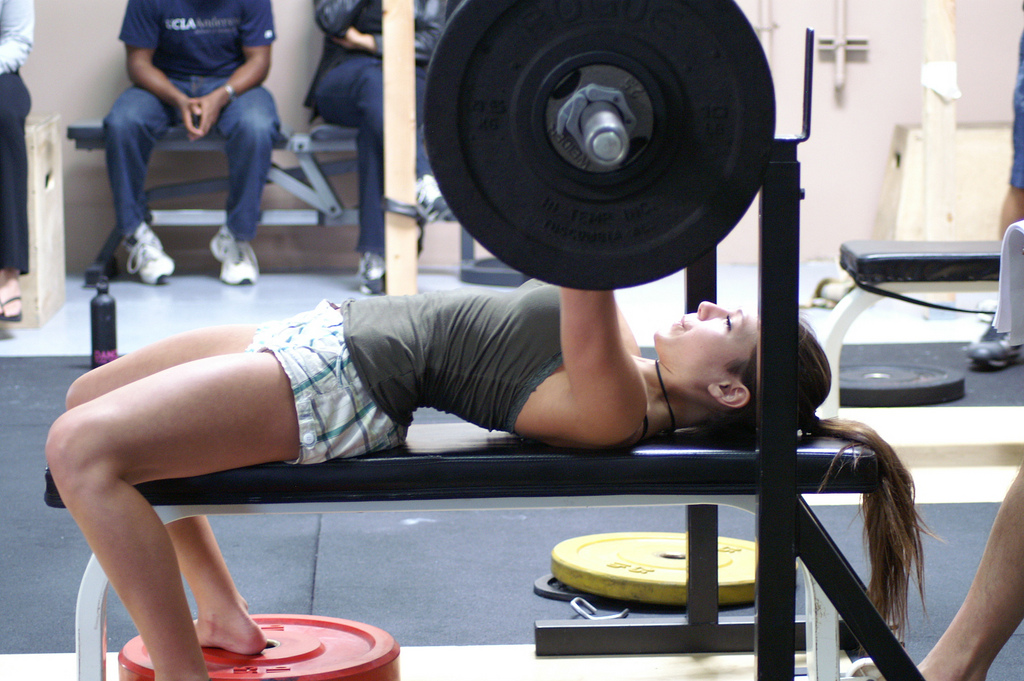
Curve Appeal—Exercises to Help Add Sexy Curves
What is the most common thing you see women do in the gym? Cardio. And if they do lift weights the pick up a 5 pound dumbbell and do endless reps. As we have discussed, women need to lift heavy, challenging weights just like men in order to gain muscle. While machines do provide sufficient stimulation to gain muscle, nothing can beat free-weight/compound exercises.
Deadlifts are a full body exercise, meaning it stimulates just about every muscle in the body. Deadlifts hit the legs, back, traps, abs, obliques, etc. Deadlifts are a must for building a fully developed body. If you don’t do them, you are selling your results short.
Squats
Squats are perhaps the most effective exercise you can do for overall leg development. Free-weight barbell squats are a compound exercise that hits the entire upper leg, quadriceps, hamstrings, and glutes. Like deadlifts, if you don’t squat you are selling yourself short. These are a must for sexy, toned legs.
Lunges
Lunges are great for targeting the glutes, hamstrings, and quadriceps. Lunges will help tighten up your legs and butt and give you the curves you want.
Pull-Ups
Pull-ups work the muscles of the back, biceps, and forearms. Most gyms have an assisted pull-up machine, so if you cannot do pull-ups with your bodyweight, this machine will allow you to do pull-ups with less than your bodyweight.
Dips
Dips work the muscles of the chest, shoulders, and triceps. Dips are a great exercise for overall upper body development, especially the shoulders and triceps.
Most gyms have an assisted dip machine, so if you cannot do dips with your bodyweight, this machine will allow you to do dips with less than your bodyweight.
As we said before, women need to lift heavy, challenging weights in order to gain muscle. Lifting heavy weights will not cause women to get big and bulky like men because women produce a fraction of the testosterone that men do. When women begin working out, their goals are to tone up and gain shape/curves and following this program will accomplish just that! In this 12-week program, you will decrease the number of reps you complete and increase the load you lift as you progress. The number of sets per exercise stays the same, but the rep range changes.
Weeks 1-4
During weeks 1-4, you will be lifting in the 8-12 rep range. What this means is that you want to complete at least 8 reps but no more than 12 reps for each set. If you cannot complete 8 reps, then the weight is too heavy and you should decrease the load. If you can complete more than 12 reps, then the weight is too light and you should increase the load.

Weeks 5-8
During weeks 5-8, you will be lifting in the 6-8 rep range. What this means is that you want to complete at least 6 reps but no more than 8 reps for each set. If you cannot complete 6 reps, then the weight is too heavy and you should decrease the load. If you can complete more than 8 reps, then the weight is too light and you should increase the load.
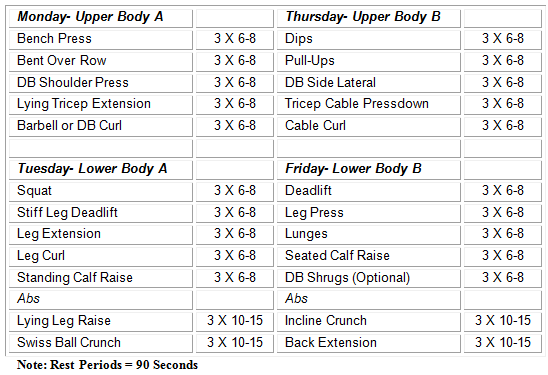
Weeks 9-12
During weeks 9-12, you will be lifting in the 4-6 rep range. What this means is that you want to complete at least 4 reps but no more than 6 reps for each set. If you cannot complete 4 reps, then the weight is too heavy and you should decrease the load. If you can complete more than 6 reps, then the weight is too light and you should increase the load.
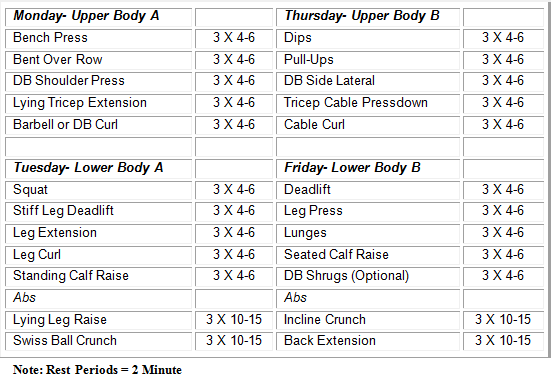
Exercise Tips: Form Over Ego!
 We cannot stress enough how important it is to maintain strict form on all movements. This means stabilizing your body and contracting your abs so you isolate the primary intended muscles. For example, when doing a standing barbell curl, tighten your abs and do not rock or swing the weight. By tightening your abs, you stabilize your body and prevent momentum. This will also help condition your abs and save your lower back from injury.
We cannot stress enough how important it is to maintain strict form on all movements. This means stabilizing your body and contracting your abs so you isolate the primary intended muscles. For example, when doing a standing barbell curl, tighten your abs and do not rock or swing the weight. By tightening your abs, you stabilize your body and prevent momentum. This will also help condition your abs and save your lower back from injury.
Warm-Up Properly
You should perform 1-3 warm-ups sets before working a given muscle group. For example, I you are going to bench press 85 lbs for your work sets then do a warm-up set with 45 lbs (just the bar) and then a set with 65 lbs before trying to bench press 85 lbs.
Rest, Don’t Nap, Between Sets
We recommend 60-120 seconds of rest periods between sets. This allows your body to recover some of its expended ATP but is not so long that you lose the flow of the workout. Remember, the goal is to get in and out of the weight room in 30-45 minutes.
What if I Miss a Workout?
If you miss a workout, simply work your schedule so you get back on track. Do not skip a workout! You have three off days per week. If you miss Tuesday’s workout then try to do it on Wednesday and then get back on your normal schedule.
Most women have “trouble areas” or places on the body where the most fat is stored and it is difficult to get rid of. In most women these areas are primarily the thighs, glutes (butt), and in some women the triceps (back of the arms) and “love handles”. After dieting to lose weight and tone up these trouble areas the last thing you want to do is regain excess fat. If you don’t keep your diet clean and controlled you will gain fat, and it will most likely be in these trouble areas. We will go over why these trouble areas exist and then outline a plan to keep these trouble areas lean and sexy while adding lean mass.
While all cells contain some fat, it is mainly stored in muscle (intramuscular triglycerides) and in adipose tissue (body fat). Adipose tissue is the body’s main fat storage site and the fat we all want to lose. Adipose tissue is divided into individual cells called adipocytes. These adipocytes hold stored triglyceride (1 glycerol molecule bonded to 3 fatty acids) droplets, which serve as a source of energy for the body. These droplets make up 95% of adipocytes’ volume. In order for this storage of potential energy (60,000-100,000 kcal) to be used and to LOSE BODYFAT (everyone’s goal), it must be mobilized through lipolysis (the breakdown of triglycerides).

FFA Oxidation—Burning Body Fat
When the FFAs reach muscle tissue, they are transported into a muscle cell. Once in the muscle cell, the FFAs can re-esterfy (rebind) with glycerol to form triglycerides to be stored in the muscle or bind with intramuscular proteins to be used for energy production in the mitochondria. In the mitochondria, the fatty acids undergo beta-oxidation, meaning they are burned for energy.
We learned that NE/E activate the receptors that stimulate lipolysis (fat breakdown). Research shows that NE/E secretion increases with exercise intensity. In addition, as cardio duration increases fat utilization increases while carbohydrate utilization decreases. So we need to perform high-intensity cardio for a long duration of time to maximize fat burning. The only problem is one cannot maintain high-intensity cardio for a long duration.
So how can we overcome this while maximizing fat loss?
Norepinephrine and Adrenergic Receptors
Body fat storage is controlled by many different factors ranging from diet to hormones to receptor density (the amount of receptors in one area). Of importance to this article is receptor density. Without diving too deep into the nerdy science stuff, a receptor can be looked at like a lock that a key (i.e. a hormone) fits into.
Adrenaline
The term “adrenaline” is commonly used to refer to the body’s excitatory catecholamines, Epinephrine (E) and Norepinephrine (NE), which are regulators of lipolysis (fat breakdown). NE and E acts on receptors called adrenergic receptors of which there are alpha (1 & 2) and beta (1, 2, & 3) subtypes. Activation of the alpha1 and beta-receptors is lipolytic (causes fat breakdown) while activation of the alpha2 receptor is anti-lipolytic (blunts fat breakdown). Stubborn fat areas have a high density of alpha2 receptors, making it harder for fat breakdown to occur in that area. If you are a women this means you have a large amount of alpha2 receptors in your thighs and glutes.
Cayenne peppers have been used for centuries as a folk medicine for stimulating circulation, aiding digestion and relieving pain (topically). Cayenne increases thermogenesis by dilating blood vessels and increasing blood circulation. Blood flow to adipose tissue is very important for the transportation of fatty acids to be burned. Increasing blood flow allows more fatty acids to be delivered to tissues where they can be burned. In order to lose body fat you must burn fat!
Caffeine USP
Caffeine, a plant alkaloid belonging to the drug class methylxanthines and is found in natural sources such as coffee beans, tea leaves, cocoa beans, and other plants, is the world’s most widely used stimulant. Caffeine is a Central Nervous System (CNS) stimulant shown to delay fatigue and improve cognitive performance.
Hordinine HCL
Hordinine increases the liberation of NE and also decreases its breakdown, leading to both faster and prolonged stimulatory effect from NE. Liberating NE and prolonging its activity will lead to more energy and greater lipolysis. Hordinine also inhibits the Monoamine Oxidases-B (MAO-B) enzyme, which is responsible for the breakdown of dopamine. Dopamine is a catecholamine involved in the regulation of appetite, mood, and other functions. Prolonging dopamine’s activity will lead to an improvement in mood and a decrease in appetite, both of which are beneficial while dieting. Hordinine gives you more energy, decreases your appetite, improves your mood, and increases fat loss.
Synephrine HCL
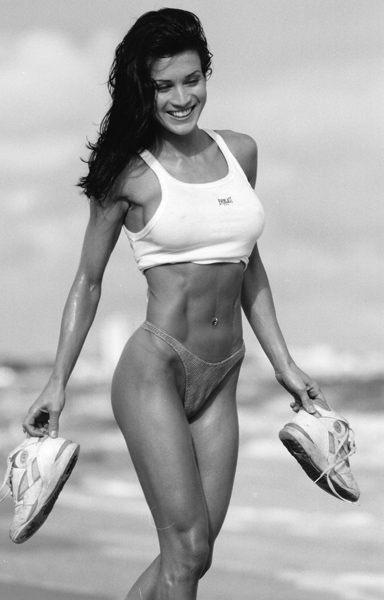 Synephrine is an amine found in the Citrus aurantium fruit. This fruit has been used in Eastern medicine for hundreds of years. Synephrine can increase ones metabolic rate and thermogenesis without any side effects on blood pressure or cardiovascular health. An increased metabolic rate means more calories are burned. Synephrine’s effect on metabolic rate lies in its ability to bind to specific adrenergic receptors, the ?-1.
Synephrine is an amine found in the Citrus aurantium fruit. This fruit has been used in Eastern medicine for hundreds of years. Synephrine can increase ones metabolic rate and thermogenesis without any side effects on blood pressure or cardiovascular health. An increased metabolic rate means more calories are burned. Synephrine’s effect on metabolic rate lies in its ability to bind to specific adrenergic receptors, the ?-1.
Vinpocetine increases circulation and blood flow to the brain. Just like cayenne, vinpocetine’s ability to increase blood flow aids in the transportation of fatty acids to tissues where they can be burned.
Yohimbine HCL
Yohimbine is an alpha2 receptor antagonist. The catecholamine norepinephrine (NE) is released in times of stress and intense activity to increase the amount of available energy by releasing stores nutrients (i.e. fatty acids from fat cells). NE activates both the beta and alpha adrenergic receptors. Activation of the beta receptors increases fatty acid liberation from fat cells while activation of the alpha receptor inhibits liberation of fatty acids.
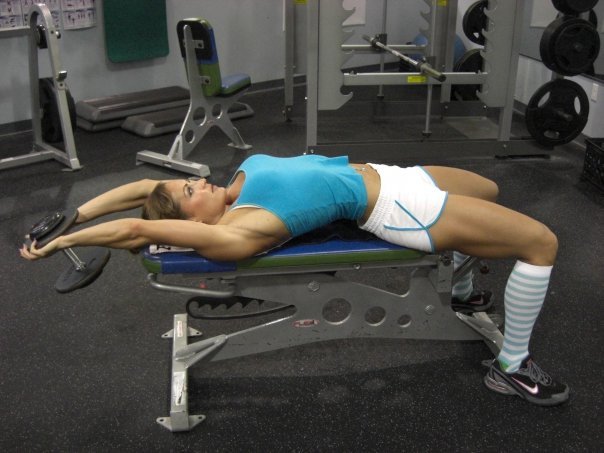
Wrap-Up
Trimfat targets all of the fat loss pathways; Trimfat increases fat breakdown, increases blood flow so the fatty acids can be transported to tissues to be burned, increases the burning of fatty acids, and blocks the Alpha2 receptors which are responsible for stubborn fat. Using Trimfat will allow you to lose fat like never before and get rid of that stubborn fat! Say goodbye to hip and thigh fat for good!
Supplement Stack: Xtend + VasoCharge
Scivation Vasocharge
We have formulated Scivation Vasocharge around ingredients that are scientifically proven to increase performance and lean muscle growth. Vasocharge contains synergistic ingredients that work together to take the results you will see to the next level and beyond.
Scivation Xtend
We have formulated Scivation Xtend to increase protein synthesis, recovery, and performance using a precise blend Branch-Chained-Amino Acids (BCAA), L-Glutamine, and Citrulline Malate. BCAA are a must have for workout nutrition. In summary, the metabolic roles of the BCAA Include:
Increasing Protein Synthesis
Vasocharge + Xtend
By combining Vasocharge and Xtend pre-workout you prime your body for heightened performance and anabolism. Our pre-workout recommendation (taking 15 minutes pre-workout) is:
Protein Benefits and Requirements for Active Women

Unfortunately, protein is a nutrient often downplayed when it comes to women’s diets. For some reason, many people seem to think women don’t need to emphasize protein in their diets, but I am here to tell you that we DO. Protein is made up of amino acids, the building blocks of many tissues in the body, including muscle. Certain amino acids are “essential”, which means the body cannot make them and they must be obtained through your diet. When you workout, you breakdown muscle tissue. In order to repair that muscle tissue and gain lean mass and become stronger, you must give the body protein to supply the amino acids needed for recovery. If you do not get enough protein in your diet your body will not have enough amino acids, specifically essential amino acids, to work properly and recovery from workouts. Where will it get these amino acids you are lacking?
The recommended daily allowance of protein for SEDENTARY adults is 0.8 grams per kilogram of bodyweight (0.8g/kg) or 0.36 grams per pound of bodyweight (0.36g/lb). One should note that the recommended protein ratio is the same for both men and women. But what about active women, do they need more protein than sedentary women? The answer is a resounding YES.
</section>
<section class="cb-entry-content clearfix" style="box-sizing: border-box; zoom: 1; margin: 0px 0px 30px; color: rgb(72, 72, 72); font-family: 'Open Sans', sans-serif; font-size: 14px; line-height: 25.2px;">

The primary concern women have when it comes to weight training is, “I don’t want to get big or bulky.” We are here to tell you that you won’t!
The Testosterone Story
The hormone testosterone is responsible for the large increases in muscle mass seen when men lift weights. Women’s testosterone levels are a fraction of men’s testosterone levels. Normal testosterone levels in men are 200-1200 ng/dl while 15-70 ng/dl are normal in women. As you can see, men’s testosterone levels are SIGNIFICANTLY higher than women’s. Even if a man is at the LOW end of the men’s normal testosterone range (200 ng/dl), he still has more than twice the amount of testosterone as a woman at the HIGH end of the women’s normal testosterone range (70 ng/dl). If we look at the median or mid-range testosterone levels in men and women, men = 700 and women = 42.5. So on an average, men have 16.47 times more testosterone than women! It is clear that women do not have the hormonal support (testosterone) to gain muscle mass like men. Therefore, the fear of becoming big and bulky and looking like Arnold Schwarzenegger with a ponytail is unwarranted.
What about the female bodybuilders?
Now you may be saying, “I have seen some female bodybuilders who are very muscular and look similar to men in their build.” The real reason they look like that is they are most-likely using exogenous testosterone injections and/or other anabolic steroids. When women use exogenous testosterone/steroids they may show signs of hair growth on the face and chest, increased muscle mass, a redistribution of body fat from a female pattern of storage to a male pattern of storage, deepening of the voice, and other effects. The point of saying this is that unless you are on exogenous testosterone or other anabolic steroids, you will not become big and bulky from lifting weights.
This is not to say that you will not gain any muscle, you will, but you will not gain muscle like a man. Instead, you will become toned and shapely.

Research & Studies
Studies have shown that men and women do not need to train differently.
If you are a woman and want to gain muscle and improve your shape and curves, then you are going to have to lift heavy weights. This means that instead doing endless reps with light weights, as the media often prescribes women to do, you need to lift some heavy weights and really challenge yourself! While performing high rep sets (15-20 reps) does have some benefit, it is not optimal to adding muscle mass.
Here is a very vague overview of rep ranges:
- 1-5 reps = Strength

- 6-12 = Hypertrophy
- 12+ = Endurance
Diet & Nutrition
Men and women do not need to train differently to see results, but what about diet? Should women eat differently than men? Not really. Men’s and women’s metabolisms are very similar except that women burn a greater ratio of fat to carbs than men. This may be one of the reasons women do well on lower carb diets. The main thing that needs to be adjusted is one’s total caloric intake. Women need fewer calories than men because men have more muscle mass and less fat (relative to total bodyweight) than women. The amount of protein, carbs, and fat will be dictated by the amount of calories one eats.
We have shown that women do not need to train or diet much differently than men. Then why do we always see women in gym performing hours of cardio and lifting the lightest dumbbells in the gym for endless reps?
This is most-likely due to not being informed, or even misinformed (by the media), about how women should train. What about diet? One of the most common breakfast meals recommended to women is yogurt and a banana. Now there is nothing wrong with eating a yogurt and banana, but where is the protein and essential fatty acids? If you are a woman trying to gain lean muscle, you will need to eat adequate protein and good fats (essential fatty acids). It is time to stop listening to the media and misinformed individuals and time to become educated and get results. In this article, we will go over some basic diet and training information and then direct you to where YOU can get diet and training help and direction!
Dieting for Women — General Guidelines
Before we get into the recommended diets for women trying to lose fat and gain lean muscle, let’s go over some general diet guidelines.
Calorie Control
The biggest factor in a diet is calories in versus calories out; your total calories will determine if you lose or gain weight. Eating too many calories will lead to fat gain. But if you don’t eat enough calories you will not gain lean muscle. Setting a target calorie intake and counting the amount of calories you eat each day is vital to losing fat and gaining lean muscle.
Macronutrient Manipulation
While your total caloric intake is the most important diet factor, the ratio of protein to carbs to fat can dictate whether the weight you gain/lose is muscle or fat. A diet that contains 80% of calories from carbs, 10% from protein, and 10% from fat will produce different results than a diet containing 40% of calories from carbs, 40% from protein, and 20% from fat.
Stay Hydrated
You should drink plenty of water every day. Try to drink at least eight glasses (or 64 oz.) of water per day. The benefits drinking water provides are optimal hydration as well as a feeling of “fullness” without added calories. Sometimes people will mistake thirst for hunger. Because of this, staying hydrated can also prevent overeating.
Quality Control
Choose fresh, wholesome foods over pre-packaged, processed foods. Packaged foods are loaded with preservatives, especially sodium and saturated fats, and often have high amounts of sugars, such as high fructose corn syrup.
You will be amazed at how fast you can lose fat just by packing meals from home rather than purchasing fast food or packaged foods. You also will save a lot of money!
Insulin Control
Insulin is the “storage” hormone. When it is secreted fat burning is blunted. By controlling insulin secretion by choosing low GI carbs you can decrease fat gain/increase fat loss. Stable blood sugar levels also improve energy levels and ones mood. All of our diets as based around insulin control, leading to leaner muscle gains with little to no fat gain.
Adequate Protein
In order to gain lean muscle you need to eat enough protein to sustain the creation of new muscle proteins. You may not be used to eating the amount of protein our prescribed diet recommends, but once you get into the groove you should not have any problems and will enjoy how full and satisfied you feel.
Essential Fats
Essential fatty acids (EFAs) are vital to the proper functioning on your body. Dietary fats got a bad rap due to the diet fads of the 80’s and 90’s, which promoted eating as little fat as possible, but in reality EFAs are needed by the body and are part of a healthy diet. Eating fats does not equate to getting fat. In fact, most EFAs help support the fat burning process and maintaining a lean body. Do not be scared to eat good fats. EFAs are not the enemy. Also, be sure to supplement with a QUALITY EFA product, such as Scivation Essential FA.
Women do not need to diet much differently than men. One metabolic difference between men and women is women burn a greater ratio of fat to carbs than men, which is the reason why women tend to do very well on a low carb diet. Due to this fact we recommend women follow a low-carb (not no carb) diet to lose fat and gain toned, lean muscle.

Curve Appeal—Exercises to Help Add Sexy Curves
What is the most common thing you see women do in the gym? Cardio. And if they do lift weights the pick up a 5 pound dumbbell and do endless reps. As we have discussed, women need to lift heavy, challenging weights just like men in order to gain muscle. While machines do provide sufficient stimulation to gain muscle, nothing can beat free-weight/compound exercises.
Now, we will go over a few free-weight and compound exercises that we will incorporate in the weight training presented.
Deadlifts
Deadlifts are a full body exercise, meaning it stimulates just about every muscle in the body. Deadlifts hit the legs, back, traps, abs, obliques, etc. Deadlifts are a must for building a fully developed body. If you don’t do them, you are selling your results short.
Squats
Squats are perhaps the most effective exercise you can do for overall leg development. Free-weight barbell squats are a compound exercise that hits the entire upper leg, quadriceps, hamstrings, and glutes. Like deadlifts, if you don’t squat you are selling yourself short. These are a must for sexy, toned legs.
Lunges
Lunges are great for targeting the glutes, hamstrings, and quadriceps. Lunges will help tighten up your legs and butt and give you the curves you want.
Pull-Ups
Pull-ups work the muscles of the back, biceps, and forearms. Most gyms have an assisted pull-up machine, so if you cannot do pull-ups with your bodyweight, this machine will allow you to do pull-ups with less than your bodyweight.
Dips
Dips work the muscles of the chest, shoulders, and triceps. Dips are a great exercise for overall upper body development, especially the shoulders and triceps.
Most gyms have an assisted dip machine, so if you cannot do dips with your bodyweight, this machine will allow you to do dips with less than your bodyweight.
For a visual demonstration of these exercises go to www.exrx.net
The 12-Week Workout Program
As we said before, women need to lift heavy, challenging weights in order to gain muscle. Lifting heavy weights will not cause women to get big and bulky like men because women produce a fraction of the testosterone that men do. When women begin working out, their goals are to tone up and gain shape/curves and following this program will accomplish just that! In this 12-week program, you will decrease the number of reps you complete and increase the load you lift as you progress. The number of sets per exercise stays the same, but the rep range changes.
Weeks 1-4
During weeks 1-4, you will be lifting in the 8-12 rep range. What this means is that you want to complete at least 8 reps but no more than 12 reps for each set. If you cannot complete 8 reps, then the weight is too heavy and you should decrease the load. If you can complete more than 12 reps, then the weight is too light and you should increase the load.

Weeks 5-8
During weeks 5-8, you will be lifting in the 6-8 rep range. What this means is that you want to complete at least 6 reps but no more than 8 reps for each set. If you cannot complete 6 reps, then the weight is too heavy and you should decrease the load. If you can complete more than 8 reps, then the weight is too light and you should increase the load.

Weeks 9-12
During weeks 9-12, you will be lifting in the 4-6 rep range. What this means is that you want to complete at least 4 reps but no more than 6 reps for each set. If you cannot complete 4 reps, then the weight is too heavy and you should decrease the load. If you can complete more than 6 reps, then the weight is too light and you should increase the load.
This phase of the 12-week program is going to be very challenging and produce accelerated results.

Exercise Tips: Form Over Ego!

Warm-Up Properly
You should perform 1-3 warm-ups sets before working a given muscle group. For example, I you are going to bench press 85 lbs for your work sets then do a warm-up set with 45 lbs (just the bar) and then a set with 65 lbs before trying to bench press 85 lbs.
Rest, Don’t Nap, Between Sets
We recommend 60-120 seconds of rest periods between sets. This allows your body to recover some of its expended ATP but is not so long that you lose the flow of the workout. Remember, the goal is to get in and out of the weight room in 30-45 minutes.
What if I Miss a Workout?
If you miss a workout, simply work your schedule so you get back on track. Do not skip a workout! You have three off days per week. If you miss Tuesday’s workout then try to do it on Wednesday and then get back on your normal schedule.
You now have a complete 12-week workout program. Next we are going to discuss a topic that will interest all women, why do trouble areas of fat exist?
Tricep, Thigh & Booty Fat: Why “Trouble Areas” Exist
Most women have “trouble areas” or places on the body where the most fat is stored and it is difficult to get rid of. In most women these areas are primarily the thighs, glutes (butt), and in some women the triceps (back of the arms) and “love handles”. After dieting to lose weight and tone up these trouble areas the last thing you want to do is regain excess fat. If you don’t keep your diet clean and controlled you will gain fat, and it will most likely be in these trouble areas. We will go over why these trouble areas exist and then outline a plan to keep these trouble areas lean and sexy while adding lean mass.
Simply put, some areas in the body have more receptors that block fat breakdown than receptors that increase fat breakdown. In men, these areas are the lower abs and love handles. In women, they are the thighs and butt. We will discuss the physiological factors controlling fat loss and then go over a stubborn-fat cardio protocol and then beneficial supplements for losing stubborn fat.
Stored Triglycerides—Body Fat We Want to LOSE
While all cells contain some fat, it is mainly stored in muscle (intramuscular triglycerides) and in adipose tissue (body fat). Adipose tissue is the body’s main fat storage site and the fat we all want to lose. Adipose tissue is divided into individual cells called adipocytes. These adipocytes hold stored triglyceride (1 glycerol molecule bonded to 3 fatty acids) droplets, which serve as a source of energy for the body. These droplets make up 95% of adipocytes’ volume. In order for this storage of potential energy (60,000-100,000 kcal) to be used and to LOSE BODYFAT (everyone’s goal), it must be mobilized through lipolysis (the breakdown of triglycerides).
Lipolysis involves splitting the triglycerides into a glycerol molecule and 3 separate fatty acids (FFA). Once the fatty acids diffuse (exit) from the adipocytes, they bind to plasma albumin (a protein in the blood) in order to be transported to active tissues where they can be burned. In order to lose body fat, the fatty acids must be burned!
Transport of FFA to be Burned!

Blood flow is of prime importance to the transportation of FFA away from adipocytes and through the circulation to active tissues where they can be burned. This is especially important during exercise where energy requirements are heightened.
Low blood flow could cause the accumulation of FFA within adipose tissue resulting in less available FFA to be oxidized and a greater chance of FFA to be turned back into triglycerides. It has been found that the stubborn fat areas (thighs and butt) have poor blood flow. Therefore in order to get rid of stubborn fat we must increase blood flow. What is the best way to increase blood flow? Exercise! In addition to this certain supplements can also increase blood flow (more on this later). Increasing blood flow throughout the body will assist in losing weight by transporting FFA to where they can be burned.
FFA Oxidation—Burning Body Fat
When the FFAs reach muscle tissue, they are transported into a muscle cell. Once in the muscle cell, the FFAs can re-esterfy (rebind) with glycerol to form triglycerides to be stored in the muscle or bind with intramuscular proteins to be used for energy production in the mitochondria. In the mitochondria, the fatty acids undergo beta-oxidation, meaning they are burned for energy.
We want the FFAs to be burned in the mitochondria. Increasing energy demands through exercise is the best way to accomplish but there are supplements that can help give you an extra boost.
Summary Thus Far
- Stubborn fat areas are caused by a high density of Alpah2 receptors and poor blood flow
- Lipolysis must be increased in order for FFAs to be burned
- Blood flow to adipose tissue and transportation of FFAs away from adipose tissue is vital to fat loss
- FFAs must be BURNED to body fat loss to occur
- Exercise is the best way to increase blood flow to adipose tissue, transportation of FFAs, and oxidation of FFAs
Knowing these facts allows us to choose supplements that will assist in burning through stubborn fat. The next chapter will go over a cardio protocol that can help burn stubborn fat and then go over some supplements to help burn fat in stubborn areas.
The Stubborn Fat Cardio Protocol
We learned that NE/E activate the receptors that stimulate lipolysis (fat breakdown). Research shows that NE/E secretion increases with exercise intensity. In addition, as cardio duration increases fat utilization increases while carbohydrate utilization decreases. So we need to perform high-intensity cardio for a long duration of time to maximize fat burning. The only problem is one cannot maintain high-intensity cardio for a long duration.
So how can we overcome this while maximizing fat loss?
By doing the following: 10-15 minutes HIIT followed by 15-30 minutes of Low-Intensity Cardio.
High Intensity Interval Training or HIIT is training where you alternate between intervals of high-intensity and low-intensity exercise. An example would be sprinting all-out for 100 meters then walking for 100 meters then repeating. One cannot sprint at full intensity for a prolonged time because sprinting and any other form of high-intensity cardio utilizes the anaerobic energy systems, specifically the Phosphocreatine system, which power short-term activity. After going all out, one must rest and give the Phosphocreatine system time to “recharge”. Additionally after sprinting all-out a couple times you are going to start feeling fatigued. After 10 sprints you are pretty much worn out. While you might not be able to sprint at full speed anymore you can still walk and jog as the intensity is not as high as sprinting and other uses the aerobic energy systems.
Knowing this we can setup a cardio program to maximize fat burning:
- 15 seconds all out followed by 45 seconds of low-intensity cardio
- Repeat 10-15 times.
- 15-30 minutes of low-intensity cardio
In addition, you can perform low-intensity cardio post-workout or on off days if Stubborn Fat Cardio is done on weight training days. This is optional, but will speed up fat loss. We recommend having at least one day a week completely off from all exercise.
The Stubborn Fat Supplement Stack
In order to lose that last bit of stubborn fat, you will have to diet and train more intensely. Sometimes that doesn’t work or is just straight up not possible. This is where specific dietary supplements that target fat loss come into play. We will now go over supplements that will help increase fat loss in stubborn areas.
Have you been working out and dieting consistently but you are not seeing the results you want? Are you starting to lean out, but you have some stubborn fat that will not go away? Most likely, this stubborn fat is on your hips and thighs. No matter how many lunges and squats you do, this fat just will not go away. Well, there is a reason for this. Women tend to store fat on specific areas of their body (hips and thighs) to the placement of specific receptors that make it hard to burn fat in those areas. Knowing this, PGN and its team of experts has developed Trimfat to increase fat loss and get rid of those stubborn fat areas once and for all! Read on to find out how you can be on your way to the tight, sexy body of your dreams!
Norepinephrine and Adrenergic Receptors
Body fat storage is controlled by many different factors ranging from diet to hormones to receptor density (the amount of receptors in one area). Of importance to this article is receptor density. Without diving too deep into the nerdy science stuff, a receptor can be looked at like a lock that a key (i.e. a hormone) fits into.
Adrenaline
The term “adrenaline” is commonly used to refer to the body’s excitatory catecholamines, Epinephrine (E) and Norepinephrine (NE), which are regulators of lipolysis (fat breakdown). NE and E acts on receptors called adrenergic receptors of which there are alpha (1 & 2) and beta (1, 2, & 3) subtypes. Activation of the alpha1 and beta-receptors is lipolytic (causes fat breakdown) while activation of the alpha2 receptor is anti-lipolytic (blunts fat breakdown). Stubborn fat areas have a high density of alpha2 receptors, making it harder for fat breakdown to occur in that area. If you are a women this means you have a large amount of alpha2 receptors in your thighs and glutes.
This is the reason why the fat in those areas are so hard to get rid of! In order to burn stubborn fat we must override the inhibitory effect of the alpha2 receptors. PGN Trimfat was designed to target stubborn fat areas in addition to providing an exercise and overall metabolic boost.
B Vitamins
- Vitamin B6 (Pyridoxine HCl): 50mg

- Vitamin B5 (Pantothenic Acid): 25mg
- Vitamin B12 (Methylcobalamin): 100mcg
The B vitamins are essential to whole body metabolism, especially fat loss. We included the B vitamins in Trimfat to ensure your body has what it needs to burn fat at its full potential.
Cayenne Pepper
Cayenne peppers have been used for centuries as a folk medicine for stimulating circulation, aiding digestion and relieving pain (topically). Cayenne increases thermogenesis by dilating blood vessels and increasing blood circulation. Blood flow to adipose tissue is very important for the transportation of fatty acids to be burned. Increasing blood flow allows more fatty acids to be delivered to tissues where they can be burned. In order to lose body fat you must burn fat!
Caffeine USP
Caffeine, a plant alkaloid belonging to the drug class methylxanthines and is found in natural sources such as coffee beans, tea leaves, cocoa beans, and other plants, is the world’s most widely used stimulant. Caffeine is a Central Nervous System (CNS) stimulant shown to delay fatigue and improve cognitive performance.
Caffeine acts as an adenosine receptor antagonist. Adenosine decreases the release of stimulatory/excitatory neurotransmitters (i.e. norepinephrine [NE]). Therefore, blocking the adenosine receptor allows a greater excitation to occur by increasing NE’s ability to activate the adrenergic receptors. This means you will feel more energized.
Caffeine inhibits phosphodiesterase (PDE), causing a build-up of cAMP levels and greater effect of NE on fatty acid lipolysis. PDE blunts lipolysis; therefore inhibiting PDE allows lipolysis to proceed at an accelerated rate. The end result is there are more fatty acids available for oxidation after consumption of caffeine. Caffeine increases the release of fat from body fat stores so it can be burned, leading to fat loss.
Hordinine HCL
Hordinine increases the liberation of NE and also decreases its breakdown, leading to both faster and prolonged stimulatory effect from NE. Liberating NE and prolonging its activity will lead to more energy and greater lipolysis. Hordinine also inhibits the Monoamine Oxidases-B (MAO-B) enzyme, which is responsible for the breakdown of dopamine. Dopamine is a catecholamine involved in the regulation of appetite, mood, and other functions. Prolonging dopamine’s activity will lead to an improvement in mood and a decrease in appetite, both of which are beneficial while dieting. Hordinine gives you more energy, decreases your appetite, improves your mood, and increases fat loss.
Synephrine HCL

This binding effect causes an increase in the body’s ability to metabolize stored body fat as well as a decrease in appetite.
Vinpocetine
Vinpocetine increases circulation and blood flow to the brain. Just like cayenne, vinpocetine’s ability to increase blood flow aids in the transportation of fatty acids to tissues where they can be burned.
Yohimbine HCL
Yohimbine is an alpha2 receptor antagonist. The catecholamine norepinephrine (NE) is released in times of stress and intense activity to increase the amount of available energy by releasing stores nutrients (i.e. fatty acids from fat cells). NE activates both the beta and alpha adrenergic receptors. Activation of the beta receptors increases fatty acid liberation from fat cells while activation of the alpha receptor inhibits liberation of fatty acids.
Yomhimbine blocks the alpha2 receptor, the receptor responsible for stubborn fat areas, from being activated. By blocking the alpha2 receptor with Yohimbine, the negative feedback caused by NE binding to the alpha receptors is reduced and fatty acids from those stubborn areas are released and now able to be burned.
Yohimbine has been shown to increase fat loss by increasing the amount of lipid mobilization and oxidation and blood flow to adipose tissue due to alpha2 antagonism. So Yohimbine addresses two of the fat burning principles we are trying to address: alpha2 receptor action and blood flow.
The TFI Blend was designed to increase fat release from fat cells so it can be burned, specifically stubborn fat areas, increase blood flow, and increase the fat oxidation.

Wrap-Up
Trimfat targets all of the fat loss pathways; Trimfat increases fat breakdown, increases blood flow so the fatty acids can be transported to tissues to be burned, increases the burning of fatty acids, and blocks the Alpha2 receptors which are responsible for stubborn fat. Using Trimfat will allow you to lose fat like never before and get rid of that stubborn fat! Say goodbye to hip and thigh fat for good!
Supplement Stack: Xtend + VasoCharge
Scivation has made pre-workout supplementation a thoughtless endeavor. Imagine if you could take the scientifically-proven, synergistic ingredients to guarantee you have all bases covered and to assure that you get the mind-blowing energy and unbelievable endurance to help you take your workouts to the next level.
Then imagine if you could fuel your muscles DURING your workout to encourage lean muscle growth and endless energy with enhanced recovery. If you’re like anyone here at PGN or Team Scivation, this is a dream come true. Time to stop dreaming. Scivation Xtend is the ULTIMATE pre, during and post workout formula ever created. It has even created its own category—Workout Nutrition™. Scivation VasoCharge, formerly known as VasoXplode, has become the standard in pre workout supplementation featuring Beta Alanine, NO Enhancers, Mental Performance Boosters and the VasoRush™ Blend. Scivation now gives it to you in one complete stack at an unbelievable price. The Scivation Workout Nutrition Stack™ is here, and it is time for you to get your swole on.
Q: What are two of the main causes of poor performance and lack of growth/progress for bodybuilders and fitness enthusiast?
A: Fatigue and increased protein breakdown (catabolism).
If you do not have the energy and drive to lift harder and heavier each workout then you will not grow. If you leave protein breakdown levels unchecked and allow muscle breakdown to occur during a workout then you will not grow. Without proper workout nutrition you will not grow and progress and the rate you could with sufficient diet and supplement strategies. Scivation has taken the guess work out of workout nutrition and created a supplement combo that will increase your energy and performance, delay fatigue, and decrease protein breakdown WHILE increasing protein synthesis (the key to muscle growth). It’s time to start taking your workout nutrition (pre and during workout) seriously and supplement with the Scivation Workout Nutrition Stack—Vasocharge + Xtend!A: Fatigue and increased protein breakdown (catabolism).
Scivation Vasocharge
We have formulated Scivation Vasocharge around ingredients that are scientifically proven to increase performance and lean muscle growth. Vasocharge contains synergistic ingredients that work together to take the results you will see to the next level and beyond.
- Creatine + Citrulline Malate: Synergistically increases performance
- Creatine + Beta-Alanine: Synergistically increases performance and lean mass gains
- Citrulline Malate + Arginine: Increases blood flow and amino acid deliver to skeletal muscle, leading to increased protein synthesis (muscle growth)
- Tyrosine + ALCAR + Caffeine + D,L-Phenylalanine: Increases energy and mental focus while delaying fatigue, allowing you to workout harder and longer.
Scivation Xtend
We have formulated Scivation Xtend to increase protein synthesis, recovery, and performance using a precise blend Branch-Chained-Amino Acids (BCAA), L-Glutamine, and Citrulline Malate. BCAA are a must have for workout nutrition. In summary, the metabolic roles of the BCAA Include:
- Substrate for energy production
- Substrate for protein synthesis
- Precursor for the formation of other amino acids
- Primarily Alanine and Glutamine
- Metabolic signals (Primarily Leucine)
- Stimulates protein synthesis through insulin secretion/activation of the PI3K pathway
- Stimulates protein synthesis through activation of mTOR
- Stimulates leptin expression in adipocytes through activation of mTOR
Xtend was formulated to give the body what it needs during exercise. As you exercise, the body increases the demand for various nutrients and if the body is not fed those nutrients, it must obtain them from other sources (i.e. breakdown of skeletal muscle to obtain amino acids).
Both BCAA and Glutamine oxidation/demand is increased during exercise. In order to meet this increased demand for BCAA and Glutamine, the body breaks down muscle protein. The goal of weight training is to increase protein synthesis. In order to gain muscle mass, protein turnover (protein turnover = protein synthesis – protein breakdown) must be positive. An increase in protein synthesis from weight training can lead to an increase in muscle mass. If we are increasing protein breakdown during training, we are decreasing the training session’s overall anabolic effect and limiting muscle growth.
Increasing Protein Synthesis
BCAA supplementation has been shown to not only increase protein synthesis, but also to decrease protein breakdown. By supplementing with Xtend during your workouts you are creating an ideal environment for muscle growth.
What all this means is ingesting BCAA primes your body for growth by increasing protein synthesis and energy production in muscle. All of these actions are beneficial to an athlete and should not be overlooked. There is endless research backing BCAA supplementation as part of one’s workout nutrition. In addition, the citrulline malate found in Xtend increases atp/energy production, delays fatigue, and increase blood flow and amino acid deliver to muscle and the glutamine promotes increased recovery. By supplementing with Xtend during your workouts there is no need to use those sugary sports drinks in order to recover. Xtend allows you to recover more quickly without the adding calories and sugar that can lead to fat gain.
Vasocharge + Xtend
By combining Vasocharge and Xtend pre-workout you prime your body for heightened performance and anabolism. Our pre-workout recommendation (taking 15 minutes pre-workout) is:
- 1-2 Scoops Vasocharge
- 1-2 Scoops Xtend
Protein Benefits and Requirements for Active Women

Jennifer Hendershott
“Absolutely ridiculous!” This is what I thought aloud while reading a popular diet book for women. It was appalling. Yogurt, cereal, coffee and a glass of juice for breakfast. Where the heck is the protein!? Sure, yogurt has some, but not enough to sustain the energy, satiation and nutrition that an active woman needs. It is time to set the record straight. We need to take these old school, fairy tale diets and trash them! Just as we burned our bras in the 60’s for equal rights, let’s burn our old diet books and get with the program—Women NEED protein!“You need protein to sustain muscle, energy and even promote fat loss,” says Jen Hendershott, two-time Ms. Olympia, Fitness International Champion and spokesperson for PGN Nutrition, makers of Whey Sensible.
The Protein Problem
Unfortunately, protein is a nutrient often downplayed when it comes to women’s diets. For some reason, many people seem to think women don’t need to emphasize protein in their diets, but I am here to tell you that we DO. Protein is made up of amino acids, the building blocks of many tissues in the body, including muscle. Certain amino acids are “essential”, which means the body cannot make them and they must be obtained through your diet. When you workout, you breakdown muscle tissue. In order to repair that muscle tissue and gain lean mass and become stronger, you must give the body protein to supply the amino acids needed for recovery. If you do not get enough protein in your diet your body will not have enough amino acids, specifically essential amino acids, to work properly and recovery from workouts. Where will it get these amino acids you are lacking?
That’s right, from muscle tissue! All that hard work will be wasted! In addition to being required to recover from workouts, protein and amino acids are important for many reasons, such as:
- Supports immune system function.
- Promotes healthy connective tissue, hair, nails and other tissues.
- Supports energy levels.
The recommended daily allowance of protein for SEDENTARY adults is 0.8 grams per kilogram of bodyweight (0.8g/kg) or 0.36 grams per pound of bodyweight (0.36g/lb). One should note that the recommended protein ratio is the same for both men and women. But what about active women, do they need more protein than sedentary women? The answer is a resounding YES.



